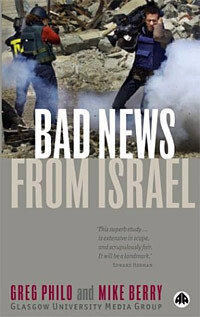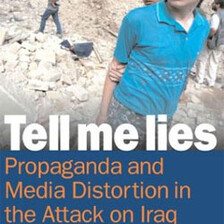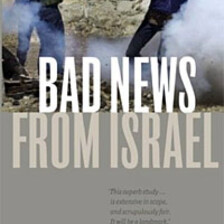Palestine Report 21 October 2004

PR: Can you tell us a little about your book, Bad News From Israel? What did you attempt to show?
Philo: The book is based on a very long research study centered on public knowledge (from Europe and the US). We found that everybody in our sample had watched news on the conflict; they had memories of it, they could describe events they had seen. However, what we found was that, overwhelmingly, very few people understood the origins, the causes of the conflict. And that was one of our initial results. We found that young people, especially, who were social science students and at very good universities, knew almost nothing (about the history of the conflict). We asked, for instance, where the Palestinian refugees had come from, and we found that only a tiny minority had any idea whatsoever. In the course of discussion, within groups, when we spoke about Israel’s recent creation, that it had been set-up in 1948, people were surprised. The majority thought that the state of Israel had been around since the time of the Bible.
PR: Who is to blame for this lack of understanding in the West?
Philo: There is no doubt that there has been a failure by the Western media. This has come about because of the closeness between Britain and the US, and their respective governments. Support for Israel in the US is extremely strong, and the American Congress tends to be very favorable to Israel, where they criticize the Palestinians and not the Israelis. And over here the UK, if you watch the news, American politicians who are often very committed to the cause of Israel are interviewed as neutral experts or just simply, politicians. This closeness then has the effect of giving access to American points of view and therefore Israeli points of view. We also found, for instance, that American politicians were interviewed twice as much as British politicians on this subject. So that has an impact and it affects the climate of Middle East journalism. The British media needs to look hard at what they are doing to inform the public, because without proper information, without a proper discussion, where you hear the points of view of both sides, you will never move towards a resolution.
PR: Are journalists in the UK under a lot of pressure to report a certain political line in the conflict?
Philo: Journalists in [the UK] are under a lot of pressure, and if they do something that is seen to criticize Israel, they are often subject to complaints and attacks. Journalist, John Pilger, for instance, after his documentary, Palestine is Still the Issue, received 4,000 emails - many of them critical. There was an inquiry into these complaints and Pilger was forced to write a 20,000-word defense of his own program. He then had to go through all these emails, which took six-weeks, and found that a large amount had come from America, where the program had not even been shown. So what you’re looking at is an organized lobby that does create a lot of problems for journalists. And the basic rule, which all journalists know without needing to be told, is that if you say something critical about the Palestinians then nothing very much happens to you, but if you say something critical about the Israelis then all but the roof falls in. And that is an everyday constraint on what they [journalists] do.
PR: You also looked at the Israeli media in your book. What did you discover?
Philo: We looked at the Israeli media to establish what the range of possible view points were. And one of the things we discovered, which we mention in the book, is that there is a wider range of arguments in the Israeli media than there is on the BBC. And that was quite extraordinary really, as there seems to be more restrictions operating in this country than Israel. We also refer to the huge range of discussion in Israel concerning the nature of the conflict, and the very in-depth critical analysis of it that you really don’t get on the BBC. You get it elsewhere, maybe The Guardian or The Independent [newspapers], but you don’t find that kind of analysis on the BBC. However, I must be clear that when I mean the BBC, I mean the mainstream channels which the bulk of the UK population watch.
PR: You also referred to the failed Camp David talks between Barak and Arafat in 2000, and the subsequent outbreak of the second Intifada. In what way was this reported?
Philo: Certainly, in the news coming from London, there was a view that the whole thing was stirred up by Arafat, that he had turned his back on peace. As such, it became the orthodoxy that the Palestinians had turned down some kind of golden offer. Many people argued, like Edward Said, for instance, that the second Intifada was at least as much against Arafat as it was against the Israelis. That Arafat’s policy of effectively allowing the settlements, of going along with the peace process which was effectively allowing the Israelis to consolidate and take over more land was actually behind the outbreak of the Intifada. But these arguments didn’t surface until later. One reason is that Palestinians aren’t very good at getting their case across, and another was that Arafat was himself quite deeply implicated in the peace process and its constituents.
After the book came out a number of journalists complained to me, saying that the Palestinians didn’t give them an alternative view. And I said that one of the problems was that they were only going to the established leadership, and it was perfectly obvious from the tiny amount of interviews done on the street that there was something else going on. That there were Palestinians who felt that Arafat was useless, and other strong opinions of this sort, which pointed to a popular people’s uprising.

Related links:


